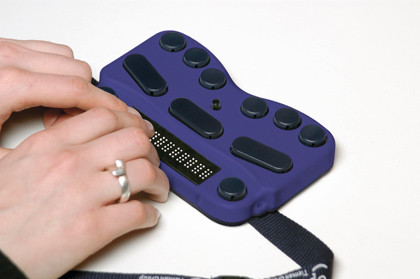It would be very tricky for many disabled people to enjoy the benefits of the web without the help of assistive technology – a catch-all term for anything that enables disabled people to achieve things that would be trickier without hardware or software assistance.
The term encompasses everything, from ramps and dropped pavements to Braille printers and brain-computer interfaces. Also included are built-in operating systems and browser functions that make computers much easier to operate.
Examples include getting the computer to emit a certain tone when the Caps Lock is activated, and the ClickLock utility, which enables highlighting and dragging of on-screen items without having to keep the left mouse button pressed.

MOBILE BRAILLE: The Optilech EasyLink 12 portable Braille input/display for mobile phones
Cohen had a definitive answer when we asked what type of assistive technology has proven most useful to him: "I have pretty severe physical limitations. So for me personally, voice recognition software has had a huge impact on my life. It allowed me the freedom to pursue my vision of creating DisabledOnline. I highly recommend it for those who have the inability of operating a standard keyboard and mouse."
Although he helps with a broad range of different needs, AbilityNet's Barker agrees: "I would say that one of the main developments is within voice recognition software. Quite a large number of our clients are interested in using this technology and now it's becoming easier to access as it comes bundled with Windows Vista and Windows 7."
While third-party titles such as Dragon Naturally Speaking provide far more features, the fact that they can cost up to £200 presents a major obstacle to a lot of people who might otherwise benefit from them. Whatever else you want to say about Vista, it was a big leap forward in terms of universally available speech recognition – both for replacing mouse and keyboard dependency with voice commands, and for dictating documents and emails in almost any application.
Get daily insight, inspiration and deals in your inbox
Sign up for breaking news, reviews, opinion, top tech deals, and more.
While speech software remains a long way off replacing all manual interactions with our PCs, it really comes into its own in continual usage by those who need it. It's worth noting that we interviewed Cohen via email, and had no idea it was all done thanks to voice recognition software until he mentioned it.
In general, though, are the major operating system and browser providers doing all that they can? "I think that it's getting easier now for people to make small tweaks to their systems," offers Barker. "For example, a client with Parkinson's may benefit a lot from just turning Filter Keys on. It's free and this just shows that adaptive technology doesn't have to cost anything."
More standardisation online has helped too: "I have seen significant improvements with accessibility online," says Cohen. "There are still some sites that need to improve their layouts, but in general I do see the World Wide Web Consortium Accessibility Guidelines being followed."
The director of the World Wide Web Consortium (W3C) is original father-of-the-internet Tim Berners-Lee, and the organisation's Accessibility Guidelines lay out key best-practice rules that every website should follow.
Major ones include providing text-based alternatives for any image, video or audio content, ensuring that everything is accessible via keyboard alone, providing easy means of navigation and orientation across busy sites and ensuring legibility. Find out more about these best-practice rules and how to implement them here.
And yet website and software creators are still routinely guilty of even the most basic oversights. The issue of colour-blindness, for instance, is regularly overlooked.
Only a pitiful handful of games provide alternate colour schemes for people who struggle to differentiate between green and red, and far too many design-led websites don't seem to notice or care that their fancy Flash menus are completely inaccessible to anyone who lacks the dexterity to use a mouse. Yet matters are gradually and continually improving.
The internet succeeds in knocking down all barriers – whether they be down to age, gender, ethnicity or physical capabilities – and, as the already multifarious means of accessing it continue to increase, so too will the traditional barriers of communication and entertainment further erode.
-------------------------------------------------------------------------------------------------------
First published in PC Plus Issue 293
Liked this? Then check out Why isn't Digital Britain disability-friendly?
Sign up for TechRadar's free Weird Week in Tech newsletter
Get the oddest tech stories of the week, plus the most popular news and reviews delivered straight to your inbox. Sign up at http://www.techradar.com/register